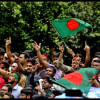The lost youth of Chattogram

The bustling streets of Chattogram now bear witness to a dark reality—at least 200 youth (kishore) gangs are wreaking havoc over the city, according to records from 16 police stations. These gangs, comprising 5-15 members each, have grown to encompass a staggering 1,400 individuals across various neighbourhoods, wielding influence and spreading fear with their criminal activities.
According to a recent report by Prothom Alo, 64 influential figures, including five ward councillors of the Chattogram City Corporation, are actively patronising these gangs. These so-called "big brothers" manipulate the vulnerable youth, coercing them into a life of crime to maintain their dominance over 45 crucial areas in the city. Their grip extends across a spectrum of illegal activities, from murder and land-grabbing to abduction, extortion, and arms trafficking, leaving a trail of devastation in their wake.
While the term "youth gangs" may suggest youthful innocence, the reality is far from it. These groups include individuals in their early teens to those as old as 32, demonstrating the alarming depths of their influence and recruitment tactics. The infamous murder of schoolboy Adnan Isfar in 2018 alerted us to the existence of these gangs, yet their reign of terror has persisted, with police recording as many as 548 crimes attributed to them in the past six years, including 34 murders. Behind the scenes, the "big brothers" manipulate and exploit impressionable youths, using them as pawns in their quest for power and profit. It's a vicious cycle of exploitation and violence that perpetuates itself through fear and intimidation.
Time and again, we have seen how people associated with the ruling party patronise these gangs, practising and preaching the love of power over the love of country or the people. What other role models exist for the youth in this country, except these "big brothers" who give these otherwise alienated youth a sense of purpose and a direct ladder to power and money?
Earlier this month, the prime minister herself expressed her concern over the dangerous tide of youth joining these gangs at a time when they should be in school, urging parents to stay vigilant. Yet, we wonder, what can parents or teachers alone do to address the erosion of values across all levels of society? Time and again, we have seen how people associated with the ruling party patronise these gangs, practising and preaching the love of power over the love of country or the people. What other role models exist for the youth in this country, except these "big brothers" who give these otherwise alienated youth a sense of purpose and a direct ladder to power and money?
While we appreciate the efforts of the law enforcement agencies to curb the influence of youth gangs, we urge them take action against those who facilitate the proliferation of weapons and drugs among our youth, regardless of their political affiliations. The allegations against city corporation councillors such as Nur Mostafa and Wasim Uddin Chowdhury must be urgently investigated. Most important of all, the overall erosion of values in society must be acknowledged and challenged, and alternative role models must be presented to the youth.

 For all latest news, follow The Daily Star's Google News channel.
For all latest news, follow The Daily Star's Google News channel. 










Comments